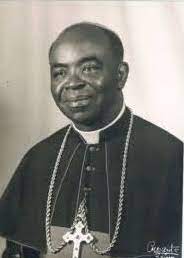Cyriacus Nnaji
Catholic Archdiocese of Lagos on Wednesday, September 14, 2022, had a double celebration. One was the Feast of Exaltation of the Holy Cross which marked the triumph of the Cross, and secondly, it was the 50th Memorial Anniversary of Most Reverend (Dr) John Kwao Amuzu Aggey, the First African Archbishop of the Metropolitan See of Lagos.
According to the officiating priest at the event which took place at Holy Cross Cathedral Lagos, Very Rev. MSGR Bernard Okodua, Vicar, Lagos Region Archdiocese, who stood in for His Grace, Most Reverend (Dr) Alfred Adewale Martins, disclosed that Exaltation of the Cross can also be referred to as the triumph of the Cross, meaning the triumph of the lord Jesus Christ on the Cross.
Describing what the cross means, Rev. MSGR Okodua said that the very word cross signifies punishment, pain or death, adding that nobody likes to carry a cross. He continued “When you have difficulties or disappointments, we call it a cross. You say I am carrying a cross, my wife is my cross, my husband is my cross, meaning he or she is not cooperating, or is difficult or he is giving you headache.”
While speaking on the meaning of the cross to Christians, he stated that it is not just the wood but the salvation. He said “In the Christian world, the cross of Jesus Christ is what we are venerating and remembering and honouring. It is not just the wood, it stands for salvation. Jesus Christ, the Son of God was sinless.
“You can punish a criminal for an offence but you don’t punish an innocent person, even Pilate said Jesus Christ was innocent but because the elders of the people hated him out of jealousy, they insisted that Pilate must condemn him to death, and so he did, just to please them. And the punishment was persecution. So they crucified him because that was one of the normal way of the Romans in punishing a criminal. For them Jesus was a criminal, for us, he is our Saviour. He chose to die on the cross willingly, he could have avoided it, if he wanted to, but he said that is what His father wanted, that is why he came into the world to suffer and to die,” Okodua stated.
He spoke further that Jesus Christ came to save man from sins through his suffering and death on the cross. “That means without the cross, no resurrection, and if Jesus did not rise from the death, then our faith and preaching has no meaning. So what we did today is simply to say thank you to God for the gift of His son and Jesus Christ for dying on the cross for us; and by so doing he is telling us that we all have to carry our own cross as he did so that we can also share in the glory of his resurrection.
“Because he died he rose, and because he rose, God honoured him, and gave him a name that is above other names. We are Christians, followers of Christ; that is the meaning, we don’t follow just by name; we follow by action. He said it, if you want to be my disciple, carry your cross, follow me, meaning imitate me. What type of imitation? Humility, submission to the will of God, love of fellow human being, forgiving those who offend us, admitting our own fault when we offend people, among others,” MSGR Okodua stated.
Speaking on the life and time of Archbishop Aggey, he said, “Honestly I was not in Lagos in his lifetime, I lived outside Lagos, and he died just three months after my ordination. So I only knew him as a seminarian. When I would have related with him as a priest, he left, so I did not know much about him except what I hear about him. He didn’t live in this premises, where the Bishop is living, he lived at Ikoyi, the Archbishop Court, but my relationship with him even as a seminarian, each time I came home, he asked us to do some casual work, and I met him on this occasions. He was a simple and humble man, he was always in his khaki short, his assistant then was the late Bishop of ijebu Ode, Bishop Albert Fashino, who was what was called mission boy at that time, and also a student of St Joseph’s Teachers Training College, Owodele in Surulere.”
On the reason the Archdiocese decided to honour him, Very Rev. MSGR Okodua said “It is because Archbishop Aggey was the first African bishop of Lagos. The one we had before him was Archbishop Tailor, the one before Tailor was Archbishop Rock; they were all Irish Priests. Rock and Tailor were all buried in the premises of the cathedral. “Aggey’s tenure didn’t last very long, he was Archbishop for only seven years, but this seven years he made an impact in the life of the people and it was the beginning of what they call indigenization of the church, we have local clergy, the church cannot grow if there is no local clergy, he promoted local clergy. As I said, he encouraged those of us at the seminary at that time, he never accepted that somebody should be expelled from the Seminary, he believed that if you entered, it means you have a vocation; that is why you are there, so he tried to nurture those vocations.
“Three months before he died, I didn’t know he was sick, in December of 1971 when I met him for the final arrangement for our ordination, I went to see him in his house at Ikoyi, after the arrangement he said to me, Bernard, pray I will be able to ordain you, I didn’t know what he meant, I didn’t know that he was sick. So that statement touched me, pray that I will be able to ordain you, it is like saying I may not ordain you, maybe I will die, but I didn’t know. And I say, thank you my grace, I will pray for you. He ordained me at Abeokuta, then posted me at a place called Adeleke in Abeokuta in Ogun State, three months later I just heard that the Archbishop was dead. I was devastated. But then he was like a big father, a holy man, very friendly and very generous,” he disclosed.
Mr Gabriel Adilano Ojomo, a Sacristan, speaking on his relationship with the late Archbishop Aggey said “That time I was still a mission boy, I met him and during his time he was good to us.”
On what he missed about Archbishop Aggey, he said “In those days he would call us, advised us, and talked to us. For him he didn’t believe that somebody cannot do something, when you were there he encouraged you, no matter how, he would encourage you, making sure you do well in that your vocation.”
Archbishop Aggey, a Togolese was born on the 5th of March, 1908. As a priest and later as an archbishop, he demonstrated both the leadership qualities of St Peter and the Evangelistic zeal of St Paul in his service to humanity. His Ordination as a priest took place in Lagos in 1944. It was the culmination of years of hard work, dedication and preparation for his priestly vocation.
Like St Dominic and St Anthony, JKA was a powerful preacher, fluent in both English and Yoruba languages. He was therefore a great asset to the church in the area of evangelism. He delivered very inspiring and uplifting homilies full of wisdom which deepened the faith convictions of his congregation.
After 28 years as a priest, 14 years as bishop, and 64 years on earth, Archbishop Aggey died after a brief illness at the Lagos University Teaching Hospital, Idi-Araba on Tuesday 14th of March, 1972.
The late Archbishop was honoured in his lifetime by the Federal Republic of Nigeria with OON (Officer of the Order of the Niger). He also held the chieftaincy title of Baba-Suwa of Egbaland and the Togolese Honour of Legion d’Honor. Anthony Cardinal Olubunmi Okogie who succeeded him renamed the prestigious Pope Pius Secondary School Mushin, as Archbishop Aggey Memorial Secondary School, in honour of the great man of God. The school is now the proposed Archbishop Aggey Technical College, Ilasamaja, Mushin.



